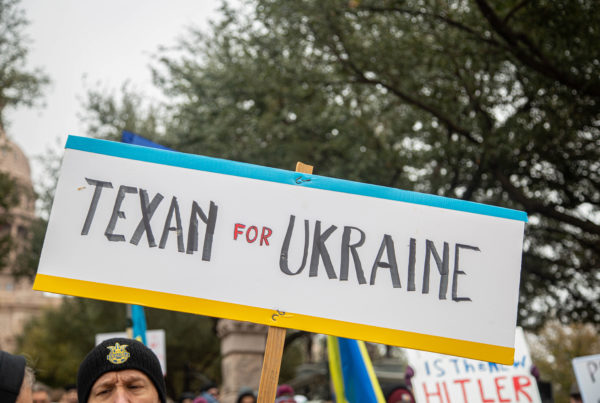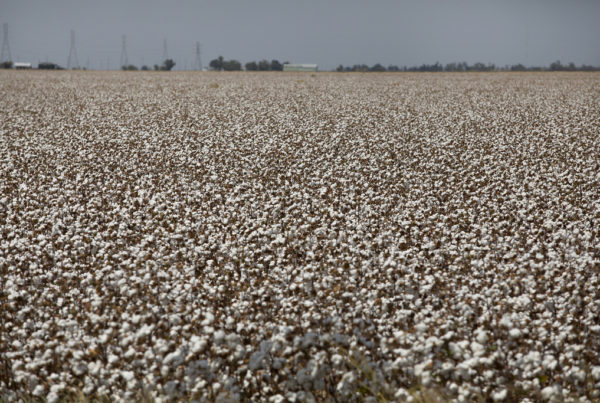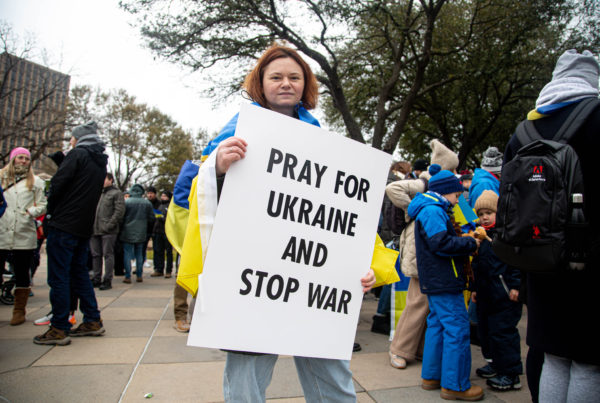The price of a barrel of oil jumped to its highest mark in nearly eight years Thursday, following news of Russia’s invasion of Ukraine. What does the conflict mean for Texas’ energy industry?
The short answer is: it’s complicated, according to Amanda Drane, business reporter for the Houston Chronicle. She tells Texas Standard that “high prices are good for Houston – to a point.” But analysts are watching if the conflict increases and prices spiral far higher. “If gasoline prices shoot up, past, $5 a gallon … that’s a threshold where consumers start driving less.”
While analysts don’t necessarily expect gas prices to spike that high, the geopolitical uncertainty is sure to roil the markets in some way. Listen to the interview above or read the transcript below.
This transcript has been edited lightly for clarity:
Texas Standard: What’s behind this huge jump in oil prices? We’re talking about a lot of uncertainty in the markets and that tends to push up prices, right?
Yeah. The geopolitical situation between Russia and Ukraine has been driving up prices for at least a couple of months now. The threat of what has been happening over the past couple of days was enough to push prices up above $90 [per barrel]. And yesterday we saw them jump above $100 before retreating later in the day Thursday.
Who counts on Russian oil, by the way? I know that that Europe gets a lot of its oil from Russia.
We all do. The analysts say the world’s oil production is like a big bathtub and some countries like the U.S. and Russia pour in more than others and there’s trade all over the world. So analysts were saying it’s likely some local refineries even import oil from Russia.
What effect will these sanctions have on Russia’s ability to sell oil in its conventional marketplaces? And what does that mean for Texas? I would imagine that means more Texas crude, and perhaps refined petroleum will be exported
So the sanctions are still rolling out with Biden sanctioning some Russian banks yesterday. The analysts I’ve been talking to over the past couple of days are still watching to see what kind of sanctions are going to hit the oil industry, what has already been happening as Russian production has been slowing. Whether they’re doing that intentionally, we don’t know. But Europe relies heavily on natural gas, and it’s the winter. So when a crisis over there, as they’ve been trying to get their hands on gas, they should have been getting from Russia but haven’t been able to.
And now, of course, the Nord Stream 2 pipeline project that is offline, at least for their foreseeable future, with Germany’s decision not to move forward there. You note in your article for the Houston Chronicle that Houston usually celebrates rising oil prices. This time, some alarms are being raised among analysts as well. What’s different?
Well, high prices are good for Houston to a point. High prices usually mean that the energy companies in Houston are going to end up producing more. They’re going to hire more people. It’s going to be good for the local economy. But if gasoline prices shoot up past, say, $5 a gallon, which seems to be the benchmark the analysts are most worried about, then that’s a threshold where consumers start driving less. They start carpooling, they start taking public transportation where they can. And that starts to reduce demand for their products.
What are the predictions that you’re hearing? I mean, is $5-a-gallon gas truly on the horizon? Is that something that analysts you spoke with expect to see here in Texas?
I would say they’re worried about it. I wouldn’t say they necessarily expect it. I think it depends on what happens with Russia and how strict the sanctions become and whether or not it continues to produce there. Their military movements right now are jeopardizing up to 1 million barrels per day of crude through Ukraine. So eyes are on that production and whether either Russia slows it or the conflict slows that or these sanctions slow it.
Do you see any effect on the global transition to renewable energy?
Well, the analysts I spoke to said that because it’s become so clear that gas can be politicized and Russia is a big producer in the rest of Europe is relying on it heavily as they wean off of coal, especially, and now they’re beholden to Russia in this geopolitically tricky situation. So some of the analysts are saying that this could push Europe faster to cleaner energy, which is, in their opinion, less subject to political manipulation.















